
RecallNet has partnered with Protocol Labs as its official network R&D partner, aiming to accelerate the rise of the “Internet of Agents.” Announced on July 4, 2025, the collaboration unites RecallNet’s decentralized AI platform with Protocol Labs’ infrastructure expertise, best known for IPFS and Filecoin. This alliance is set to power autonomous AI agents with trustless, scalable storage and communication. RecallNet’s network is already active via its February testnet. It is built on technologies like Ceramic and Tableland. That enables agents to store, share, and monetize knowledge in real time across a Web3-native, censorship-resistant architecture.
The Technologies and Vision
RecallNet was created from the merger of 3Box Labs and Textile, with a mission to build a multiplayer AI ecosystem. Its decentralized intelligence network lets AI agents collaborate using verifiable on-chain memory. Departing from monolithic AI models that rely on central infrastructure. Agents in the RecallNet ecosystem can analyze, strategize, and even compete, with use cases ranging from trading bots to educational tools. Protocol Labs, founded by Juan Benet, brings powerful tech to this mix, including IPFS for file storage, Filecoin for economic incentives, and libp2p for fast, peer-to-peer networking.
Their collaboration focuses on scaling RecallNet’s agent coordination layer, critical for supporting billions of autonomous agents. Features such as memory syncing, agent identity, and reputation systems are enabled by Protocol Labs’ decentralized infrastructure. This forms the backbone for new types of intelligent applications that require trust and traceability. Real-time agent interactions and decision-making will now happen on-chain, with RecallNet positioning itself as the go-to platform for multi-agent AI in Web3. This partnership amplifies both RecallNet’s community traction and technical execution. Combining decentralized protocols with a programmable intelligence layer that’s not only scalable but also inherently transparent and resistant to manipulation.
Community Growth and Strategic Impact
RecallNet’s testnet has already seen strong traction from Web3 projects like Collab. Land and Lit Protocol, with initiatives like AlphaWave, a competition for crypto-trading AI agents, showcasing early adoption. The platform’s Surge program rewards community engagement with Fragments (possible future token rewards). Has helped grow RecallNet’s Discord to over 200,000 members, placing it among the top 0.002% of all servers globally.
Protocol Labs’ entry boosts credibility and resources, especially for mission-critical needs like decentralized verification and secure coordination between agents. They will enable their agents to trustlessly read and write data using their IPFS and Filecoin systems, but, unlike existing systems, will be immutable and verifiable. Through their collaboration, both organizations wish to address this issue in the current AI systems: data silos and black-box decision-making.
With Protocol Labs, RecallNet can also push into more advanced agent orchestration. Handling nuanced, high-stakes decisions where transparency and accountability are essential. Their combined infrastructure supports AI agents in areas like decentralized finance, data composability, and automated governance. As the demand grows for AI-native systems that align with Web3’s values of decentralization, RecallNet, now bolstered by Protocol Labs’ engineering power, appears ready to lead the movement, bringing “proof-of-memory” and “multi-agent intelligence” into the mainstream.
Future Outlook
The RecallNet–Protocol Labs partnership is a milestone for decentralized AI. It accelerates a future where autonomous agents operate transparently, leveraging decentralized infrastructure and verifiable memory. By combining RecallNet’s intelligence layer with Protocol Labs’ Web3 architecture, the project positions itself as foundational to the Internet of Agents. With real-time note-taking bots, trading agents, and collaborative data tools in the pipeline, this alliance paves the way for a new generation of AI-native dApps. As one X user noted, “This is not just infrastructure; it’s intelligence infrastructure.” For developers and decentralization advocates alike, the AI x Web3 revolution is officially underway.






